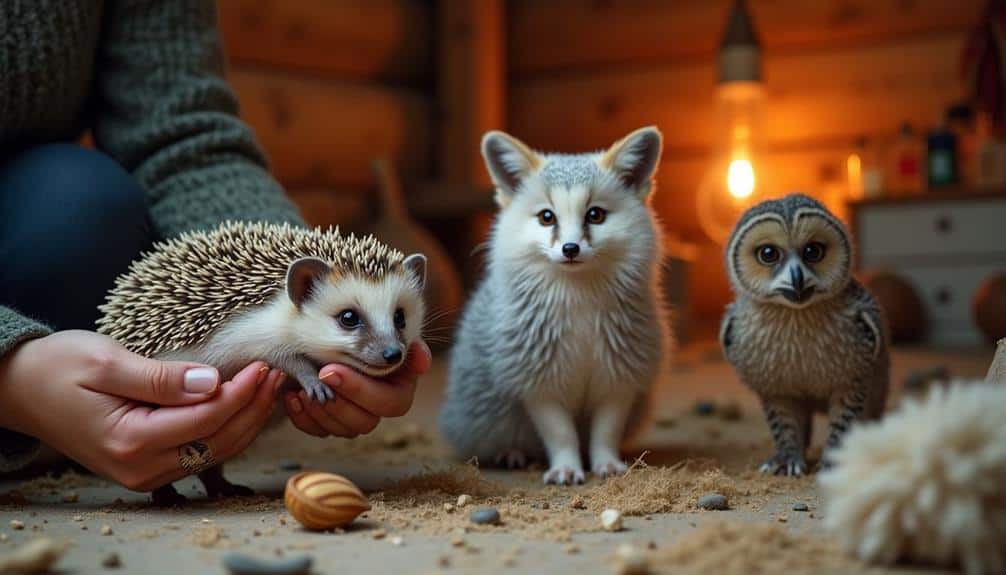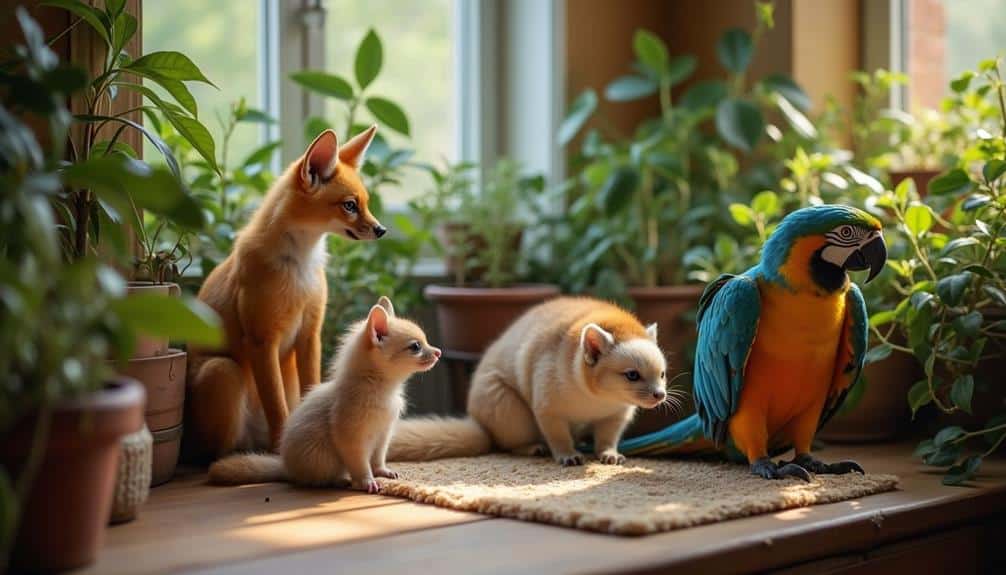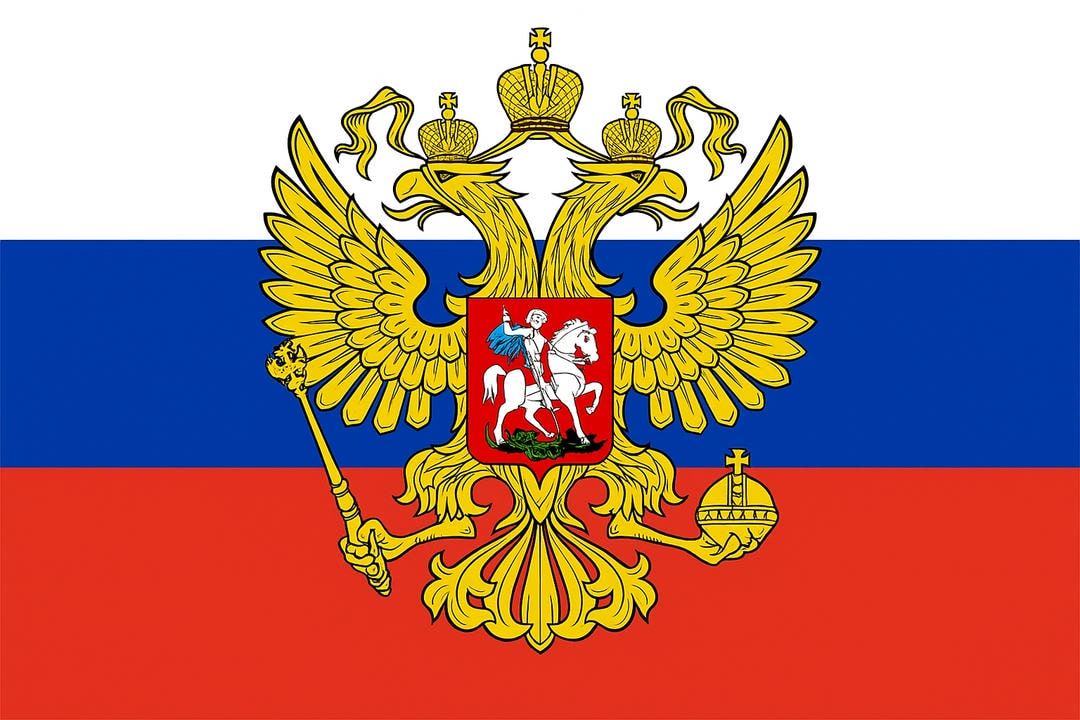In recent years, Russia has seen a remarkable rise in the rescuing and caring for unusual animals, a trend that highlights a unique blend of passion and responsibility among its citizens. This movement goes beyond mere ownership, reflecting a profound respect for biodiversity and a commitment to ethical treatment. As stories of individual rescues circulate, communities are inspired to contribute, creating a network of support and education. What drives this deep-seated fascination with exotic pets, and how does it shape conservation efforts in Russia? The answers reveal much about the nation’s evolving relationship with the natural world.
Introduction

In recent years, the ownership of exotic pets has transcended traditional boundaries, reflecting a profound affection and commitment among enthusiasts.
These dedicated individuals not only seek to provide exceptional care for their unique companions but also contribute to a broader understanding of species diversity and conservation.
This article explores the intricate world of exotic pet ownership, emphasizing the passion and responsibility that define this growing community.
Overview of exotic pet owners and their love for them
Amidst the rising trend of exotic pet ownership in Russia, a unique community has emerged, characterized by a profound reverence for rare and unusual animals. This burgeoning network of enthusiasts is drawn together by their shared passion for unique experiences and their dedication to responsible ownership.
These individuals often recount personal stories that highlight their commitment to the well-being of their extraordinary companions, providing invaluable insights into the nuances of species-specific care.
Community support plays a pivotal role, offering a platform for exchanging knowledge and fostering camaraderie among like-minded individuals. This collective effort not only enriches the lives of pet owners but also contributes considerably to species conservation.
By rescuing and rehabilitating exotic animals, these guardians play an active role in preserving biodiversity and promoting awareness about the fragility of various species.
Furthermore, the community’s dedication to responsible ownership guarantees that these rare creatures receive the specialized care they require, mitigating the risks associated with keeping exotic pets.
Through meticulous research and a compassionate approach, Russian exotic pet owners are redefining what it means to care for animals, highlighting a profound and evolving relationship with the natural world.
Popularity of Exotic Pets in Russia
In Russia, the prevalence of exotic pets has surged, encompassing a wide array of species from majestic big cats to delicate amphibians.
This trend underscores a growing fascination with unique fauna, reflecting both a deep-seated curiosity and a commitment to the ethical care of these remarkable creatures.
The variety of exotic pets across the nation highlights a cultural shift towards embracing biodiversity within domestic environments, fostering a greater sense of responsibility and community among pet enthusiasts.
Prevalence of exotic pets across Russia
Across Russia, the trend of owning exotic pets has surged, capturing the fascination of enthusiasts nationwide. This burgeoning interest is fueled by a desire for unique companionship and the thrill of caring for unusual species.
Despite the appeal, legal regulations governing exotic pet ownership remain stringent, ensuring animals’ welfare and public safety. Potential owners must navigate complex legal frameworks to acquire permits, reflecting a balance between personal freedom and responsible pet care.
Exotic pet ownership in Russia is not just a private endeavor; it often extends into community events where enthusiasts gather to share experiences, knowledge, and resources. These events foster a communal spirit and promote conservation efforts, highlighting the importance of preserving natural habitats.
Veterinary challenges are another significant aspect of this trend. Specialized care for exotic animals requires veterinarians to possess advanced knowledge and skills to address the unique needs of species ranging from reptiles to large carnivores.
This specialized care underscores the importance of proper pet care education for owners, ensuring the well-being of these extraordinary creatures.
The prevalence of exotic pets in Russia is a reflection of the country’s deep-seated passion for animal welfare and the freedom to explore unconventional forms of companionship.
Variety of exotic pet species in Russia
The fascination with unconventional companionship has led to an extraordinary variety of exotic pet species flourishing within Russian households. This trend encompasses uncommon reptiles, such as the vividly-colored chameleons and the elusive Komodo dragons, which enthrall enthusiasts with their unique physiological adaptations and behaviors.
Unique mammals, including fennec foxes and sugar gliders, have also found their way into Russian homes, offering an intriguing alternative to more traditional pets.
In the domain of aquatic wonders, species like the ethereal jellyfish and the enigmatic axolotl provide a mesmerizing glimpse into underwater ecosystems. These aquatic creatures demand specialized care, highlighting the owners’ dedication and expertise.
Feathered companions, ranging from the strikingly intelligent African grey parrots to the vibrant macaws, add a splash of color and a symphony of sounds to domestic environments, enriching the lives of their caretakers with their interactive and social nature.
Rare amphibians, such as the exotic poison dart frogs and the enthralling newts, further expand the diversity of Russia’s exotic pet landscape. These species not only introduce their owners to the complexities of amphibian care but also foster a deeper appreciation for the rich tapestry of life that these unique animals represent.
What Sparks Russians’ Love for Exotic Pets

Embracing the allure of the exotic, many Russians find themselves captivated by the challenge and responsibility of caring for unusual pets. The cultural significance of owning such animals extends beyond mere novelty; it embodies a deep-rooted appreciation for biodiversity and personal freedom.
Exotic pet ownership often intertwines with animal welfare, as individuals rescue and rehabilitate creatures in need, championing conservation efforts.
Community initiatives play a pivotal role in this phenomenon. Local groups and online forums provide a platform for enthusiasts to exchange specialized knowledge, share personal stories, and promote best practices in care and ethical treatment.
These initiatives foster a sense of camaraderie among pet owners, who are united by their shared passion and commitment to their animals’ well-being.
Personal stories of successful rescues and rehabilitations further fuel this fascination. Tales of saving a lynx from dire conditions or nurturing a rare amphibian to health resonate deeply, inspiring others to partake in similar endeavors.
The collective impact of these efforts is profound, contributing to broader conservation initiatives and enhancing public awareness about the importance of protecting endangered species.
Through these multifaceted motivations, Russians’ love for exotic pets continues to thrive, enriching lives and fostering a vibrant, compassionate community.
Conclusion
The dedication to rescuing and caring for unusual animals in Russia underscores a profound commitment to biodiversity and ethical treatment. This practice fosters conservation awareness and the protection of endangered species, reinforcing the essential human-animal bond. Community initiatives and personal rescue stories serve as catalysts for broader participation, cultivating a culture of compassion and responsibility. This phenomenon highlights the significant role of exotic pet enthusiasts in promoting conservation and enhancing the understanding of biodiversity.




